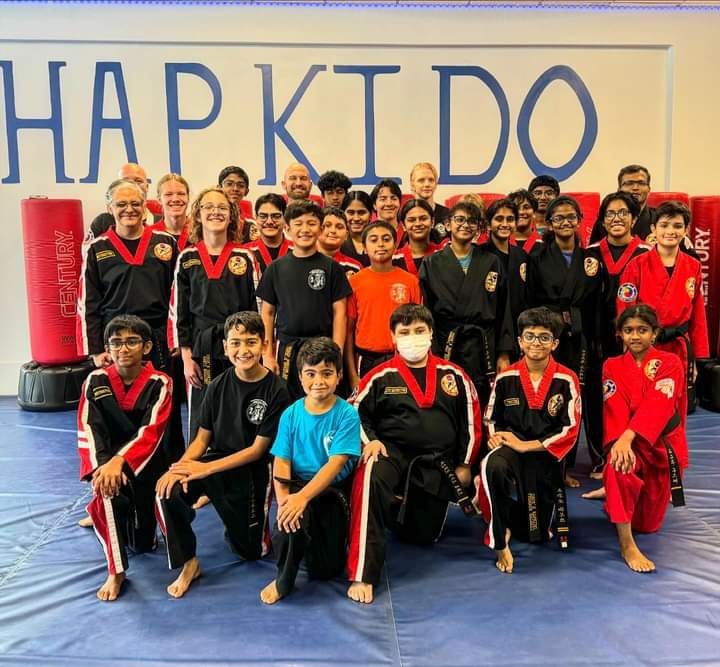The Power of Emotional Control in Today’s World
Martial Arts helps manage emotions because emotional control is a key skill for children! It’s not always taught in schools or daily life, despite the fact that we all know it is a crucial skill! Martial arts blends physical training with mental discipline, creating the perfect space for kids to develop emotional regulation. This helps them lead more balanced and happier lives. In today’s world, where emotional challenges can overwhelm children, martial arts provides a safe place for them to channel their feelings in a positive and healthy direction.
Building Emotional Awareness Through Martial Arts
One of the first steps in managing emotions is understanding them. Martial arts teaches children to become more self-aware of their feelings, whether it’s anger, frustration, or anxiety. In a structured setting, they learn how their body and mind react to different situations and how to use this awareness to prevent emotional outbursts.
Through regular training, kids begin to recognize that they have control over their responses, which builds emotional intelligence. This skill doesn’t just stay on the mats but extends into their everyday lives, helping them manage stressful situations at school or home.
Martial Arts helps children manage emotions and learn Emotional Regulation
Martial arts training often involves high-pressure situations that require quick thinking and calmness under stress. Whether practicing a sparring session or mastering a challenging technique, children are repeatedly placed in scenarios where they need to stay composed.
These experiences help kids to develop emotional regulation, a skill that allows them to manage their impulses and reactions. Instead of reacting emotionally to frustration, they learn to take a breath, assess the situation, and then respond in a measured way.
Statistics: The Power of Emotional Regulation
A study conducted by the National Institutes of Health (NIH) showed that children who engage in physical activity, especially structured activities like martial arts, demonstrate greater emotional regulation compared to their peers. This can lead to better academic performance, stronger relationships, and a reduced likelihood of engaging in harmful behaviors.
Martial Arts Builds Self-Confidence and Resilience
For children struggling with emotions, low self-confidence often plays a significant role. Martial arts training helps build self-esteem by giving kids clear goals to achieve and the satisfaction of earning new belts, mastering techniques, and receiving positive feedback from instructors.
As they develop physically and mentally, kids begin to understand their own capabilities. This newfound confidence allows them to approach emotional challenges from a position of strength rather than feeling overwhelmed.
Real-Life Benefit: Resilience in Difficult Times
Martial arts teaches children that failure is part of the learning process. Not every punch will land, and not every move will be mastered on the first try. This teaches resilience—a key trait that helps kids bounce back from emotional setbacks.
Channeling Negative Emotions in a Healthy Way
Negative emotions like anger, frustration, and sadness are natural, but martial arts gives kids an outlet to express and manage these feelings constructively. Instead of internalizing their frustrations or lashing out, martial arts offers a physical and mental release. Kicking, punching, and practicing self-defense techniques within a controlled environment help kids expel pent-up energy and stress in a healthy way.
A Sense of Belonging and Community
Many children who struggle emotionally feel isolated or misunderstood. Martial arts provides a sense of belonging within a supportive community. In martial arts classes, kids work alongside peers with shared goals, offering encouragement and respect for each other’s progress. This camaraderie fosters a sense of acceptance, which can be particularly helpful for children who feel disconnected.
martial arts helps manage emotions through Structured Discipline and Routine
Children thrive in environments that provide structure and clear expectations, especially when managing their emotions. Martial arts instills discipline and consistency. Regular attendance, adherence to training schedules, and the respect ingrained in martial arts traditions give kids a sense of order, which can help calm their emotional turmoil.
Data Point: Routine Reduces Emotional Distress
Research from the American Academy of Pediatrics has shown that children with regular routines, especially those that involve structured physical activity, experience lower levels of stress and emotional distress.
The Role of Martial Arts in Managing Harmful Emotions and Behaviors
Some children struggle with unmanaged emotions that can lead to harmful behavior toward themselves or others. Martial arts helps by giving them the tools to manage those feelings. This prevents actions driven by anger or despair.
Although this post doesn’t cover specific violent incidents, it’s important to note that the emotional skills taught in martial arts—self-discipline, awareness, and control—are powerful. These skills can guide children away from harmful choices and negative ways of expressing their emotions.
Conclusion: Helping Kids Grow Emotionally Strong with Martial Arts
Martial arts is more than just physical training; it’s a life-changing discipline that helps children develop emotional management skills. Through structured training, emotional awareness, and a supportive community, kids can learn how to manage their feelings in a way that promotes mental stability and personal growth.
Parents if you’re searching for a way to help their child develop emotional control and resilience, martial arts offers a powerful solution. By teaching children how to manage their emotions in a healthy way, martial arts empowers them to navigate life’s challenges with confidence and calm.
Try a Class today at Choe’s HapKiDo: https://trykarateclasses.com/karate-locations/schedules/

